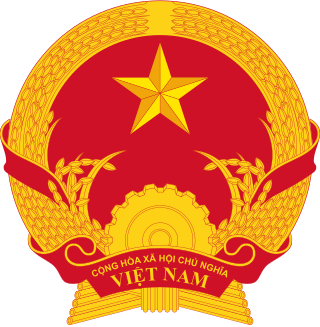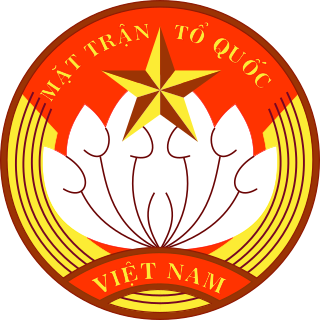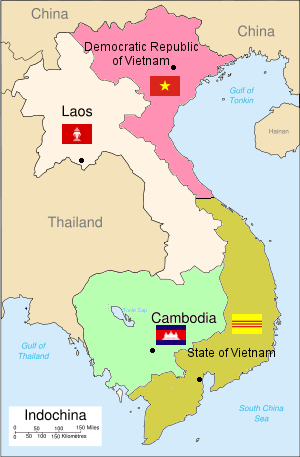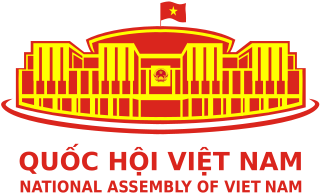
Pol Pot was a Cambodian communist revolutionary, politician and a dictator who ruled Cambodia as Prime Minister of Democratic Kampuchea between 1976 and 1979. Ideologically a communist and a Khmer ethnonationalist, he was a leading member of Cambodia's communist movement, the Khmer Rouge from 1963 to 1997, and served as General Secretary of the Communist Party of Kampuchea from 1963 to 1981. His administration converted Cambodia into a one-party communist state and perpetrated the Cambodian genocide.

The politics of Vietnam is dominated by a single party under an authoritarian system, the Communist Party of Vietnam (CPV). The President of Vietnam is the head of state, and the Prime Minister of Vietnam is the head of government. Both of these offices are separate from the General Secretary of the Communist Party of Vietnam, who leads the CPV and is head of the Politburo and the Central Military Commission. The General Secretary is thus the de facto supreme leader of Vietnam. Executive power is exercised by the government and the President of Vietnam. Legislative power is vested in the National Assembly of Vietnam. The Judiciary is independent of the executive. The parliament adopted the current Constitution of Vietnam, Vietnam's fifth, on 28 November 2013.

Hồ Chí Minh, colloquially known as Uncle Ho or just Uncle (Bác), and by other aliases and sobriquets, was a Vietnamese communist revolutionary, nationalist, and politician. He served as prime minister of the Democratic Republic of Vietnam from 1945 to 1955 and as president from 1945 until his death in 1969. Ideologically a Marxist–Leninist, he was the Chairman and First Secretary of the Workers' Party of Vietnam, the predecessor of the current Communist Party of Vietnam.

The Việt Minh was a national independence coalition formed at Pác Bó by Hồ Chí Minh on 19 May 1941. Also known as the Việt Minh Front, it was created by the Indochinese Communist Party (ICP) as a national united front to achieve the independence of the Democratic Republic of Vietnam.

The Viet Cong was an epithet and umbrella term to call the communist-driven armed movement and united front organization in South Vietnam. Formally organized as and led by the National Liberation Front of South Vietnam, it fought under the direction of North Vietnam against the South Vietnamese and United States governments during the Vietnam War. The organization had both guerrilla and regular army units, as well as a network of cadres who organized and mobilized peasants in the territory the Viet Cong controlled. During the war, communist fighters and some anti-war activists claimed that the Viet Cong was an insurgency indigenous to the South that represented the legitimate rights of people in South Vietnam, while the U.S. and South Vietnamese governments portrayed the group as a tool of North Vietnam. It was later conceded by the modern Vietnamese communist leadership that the movement was actually under the North Vietnamese political and military leadership, aiming to unify Vietnam under a single banner.

Vietnamese Americans are Americans of Vietnamese ancestry. They comprise approximately half of all overseas Vietnamese and are the fourth-largest Asian American ethnic group following Chinese Americans, Indian Americans, and Filipino Americans. There are approximately 2.3 million people of Vietnamese descent residing in the U.S. as of 2023.

The Kingdom of Cambodia, also known as the First Kingdom of Cambodia, and commonly referred to as the Sangkum period, refers to Norodom Sihanouk's first administration of Cambodia from 1953 to 1970, an especially significant time in the country's history. Sihanouk continues to be one of the most controversial figures in Southeast Asia's turbulent and often tragic postwar history. From 1955 until 1970, Sihanouk's Sangkum was the sole legal party in Cambodia.

The Vietnamese Fatherland Front is an umbrella group of mass movements in Vietnam aligned with the Communist Party of Vietnam forming the Vietnamese government. It was founded in February 1977 by the merger of the Vietnamese Fatherland Front of North Vietnam and two Viet Cong groups, the National Liberation Front of South Vietnam and the Alliance of National, Democratic, and Peace Forces. It is an amalgamation of many smaller groups, including the Communist Party itself. Other groups that participated in the establishment of the Front were the Vietnam General Confederation of Labour, the Ho Chi Minh Communist Youth Union and the Ho Chi Minh Young Pioneer Organization. It also included the Democratic Party of Vietnam and Socialist Party of Vietnam, until they disbanded in 1988. It also incorporates some officially sanctioned religious groups.

The president of the Socialist Republic of Vietnam is the head of state of Vietnam, elected by the National Assembly of Vietnam from its delegates. Since Vietnam is a one-party state, candidates for the post are nominated by the Central Committee of the Communist Party of Vietnam. The officeholder is generally considered to hold the second-highest position in the political system, practically after the General Secretary of the Communist Party of Vietnam.

The Geneva Conference was intended to settle outstanding issues resulting from the Korean War and the First Indochina War and involved several nations. It took place in Geneva, Switzerland, from 26 April to 20 July 1954. The part of the conference on the Korean question ended without adopting any declarations or proposals and so is generally considered less relevant. On the other hand, the Geneva Accords that dealt with the dismantling of French Indochina proved to have long-lasting repercussions. The crumbling of the French colonial empire in Southeast Asia led to the formation of the states of the Democratic Republic of Vietnam, the State of Vietnam, the Kingdom of Cambodia, and the Kingdom of Laos. Three agreements about French Indochina, covering Cambodia, Laos, and Vietnam, were signed on 21 July 1954 and took effect two days later.

The Paris Peace Accords, officially the Agreement on Ending the War and Restoring Peace in Viet Nam, was a peace agreement signed on January 27, 1973, to establish peace in Vietnam and end the Vietnam War. The agreement was signed by the governments of the Democratic Republic of Vietnam ; the Republic of Vietnam ; the United States; and the Provisional Revolutionary Government of the Republic of South Vietnam (PRG), which represented South Vietnamese communists. US ground forces had begun to withdraw from Vietnam in 1969, and had suffered from deteriorating morale during the withdrawal. By the beginning of 1972 those that remained had very little involvement in combat. The last American infantry battalions withdrew in August 1972. Most air and naval forces, and most advisers, also were gone from South Vietnam by that time, though air and naval forces not based in South Vietnam were still playing a large role in the war. The Paris Agreement removed the remaining US forces. Direct U.S. military intervention was ended, and fighting between the three remaining powers temporarily stopped for less than a day. The agreement was not ratified by the U.S. Senate.

Elections in the Socialist Republic of Vietnam occur under a one-party political system led by the Communist Party of Vietnam (CPV). Direct elections occurred at both the local and national levels to elect members of the People's Councils and the National Assembly, with all candidate nominations pre-approved by the CPV-led Vietnamese Fatherland Front. Elections serve the purposes of information acquisition and cooptation rather than popularity contest but still remain of significance to the political life and legitimacy of the Vietnamese party-state.

The Cambodian–Vietnamese War was an armed conflict between Democratic Kampuchea, controlled by Pol Pot's Khmer Rouge, and the Socialist Republic of Vietnam. The war began with repeated attacks by the Liberation Army of Kampuchea on the southwestern border of Vietnam, particularly the Ba Chúc massacre which resulted in the deaths of over 3,000 Vietnamese civilians. On 23 December 1978, 10 out of 19 divisions of Khmer Rouge's military divisions opened fire along the shared Southwestern borderline with Vietnam with the goal of invading the Vietnamese provinces of Đồng Tháp, An Giang and Kiên Giang. On 25 December 1978, Vietnam launched a full-scale invasion of Kampuchea, and subsequently occupied the country in 2 weeks and removed the government of the Communist Party of Kampuchea from power. In doing so, Vietnam put an ultimate stop to the Cambodian Genocide, which had most likely killed between 1.2 million and 2.8 million people — or between 13 and 30 percent of the country’s population.

The National Assembly of the Socialist Republic of Vietnam is the unicameral parliament and the highest body of state power of Vietnam. The National Assembly is the only branch of government in Vietnam and, in accordance with the principle of unified power, all state organs are subservient to it.

The Việt Nam Quốc Dân Đảng, abbreviated VNQDĐ or Việt Quốc, was a nationalist and democratic socialist political party that sought independence from French colonial rule in Vietnam during the early 20th century. Its origins lie in a group of young Hanoi-based intellectuals who began publishing revolutionary material in the mid-1920s. In 1927, after the publishing house failed because of French harassment and censorship, the VNQDĐ was formed under the leadership of Nguyễn Thái Học. Modelling itself on the Kuomintang of Nationalist China the VNQDĐ gained a small following among northerners, particularly teachers and intellectuals. The party, which was less successful among peasants and industrial workers, was organised in small clandestine cells.

Vietnamese Cambodians refers to ethnic group of Vietnamese who live in Cambodia or it refers to Vietnamese who are of full or partial Khmer descent. According to Cambodian sources, in 2013, about 15,000 Vietnamese people live in Cambodia. A Vietnamese source stated that 156,000 people live in Cambodia, while the actual number could be somewhere between 400,000 and one million people, according to independent scholars. They mostly reside in southeastern parts of Cambodia bordering Vietnam or on houseboats in the Tonlé Sap lake and Mekong rivers. The first Vietnamese came to settle modern-day Cambodia from the early 19th century during the era of the Nguyễn lords and most of the Vietnamese came to Cambodia during the periods of French colonial administration and the People's Republic of Kampuchea administration. During the Khmer Republic and Khmer Rouge governments in the 1970s under the Pol Pot regime, the Vietnamese amongst others were targets of mass genocides; thousands of Vietnamese were killed and many more sought refuge in Vietnam.

The Chairman of the National Assembly of Vietnam ,[note_5] formerly designated as the Chairman of the Standing Committee of the National Assembly of Vietnam from 1946 to 1981, is the legislative speaker of the Socialist Republic of Vietnam, presiding over the National Assembly. The National Assembly is, in the words of the constitution, "the highest representative organ of the people; the highest organ of state power".

North Vietnam, officially the Democratic Republic of Vietnam, was a socialist state in Southeast Asia that existed from 1945 to 1976, with formal sovereignty being fully recognized in 1954. A member of the Eastern Bloc, it opposed the French-supported State of Vietnam and later the Western-allied Republic of Vietnam. North Vietnam emerged victorious over South Vietnam in 1975 and ceased to exist the following year when it unified with the south to become the current Socialist Republic of Vietnam.

The deputy prime ministerof the Government of the Socialist Republic of Vietnam, known as the deputy chairman of the Council of Ministers from 1981 to 1992, is one of the highest offices within the Central Government. The deputy prime minister has throughout its history been responsible for helping the prime minister to handle Vietnam's internal policies. Since Vietnam is a one-party state, with the Communist Party of Vietnam being the sole party allowed by the constitution, all the deputy prime ministers of the Democratic Republic and the Socialist Republic have been members of the party while holding office.

Khmer nationalism is a form of nationalism found in Cambodia, that asserts that Khmers (Cambodians) are a nation and promotes the cultural unity of the Khmer (Cambodian) race.

















